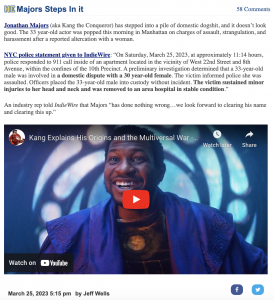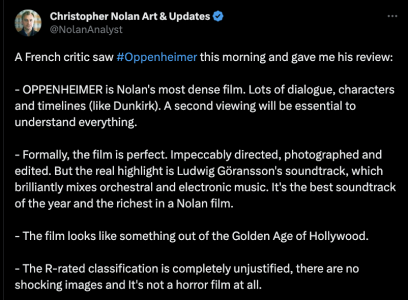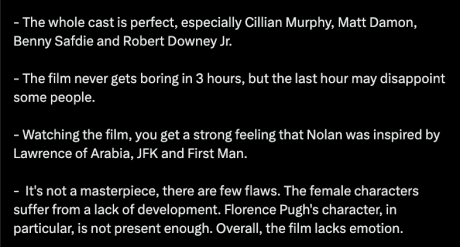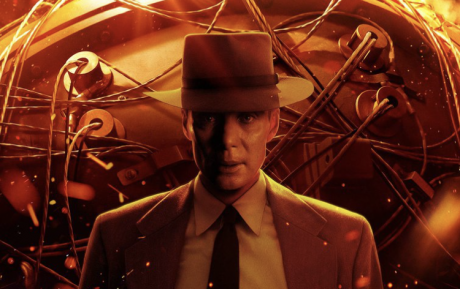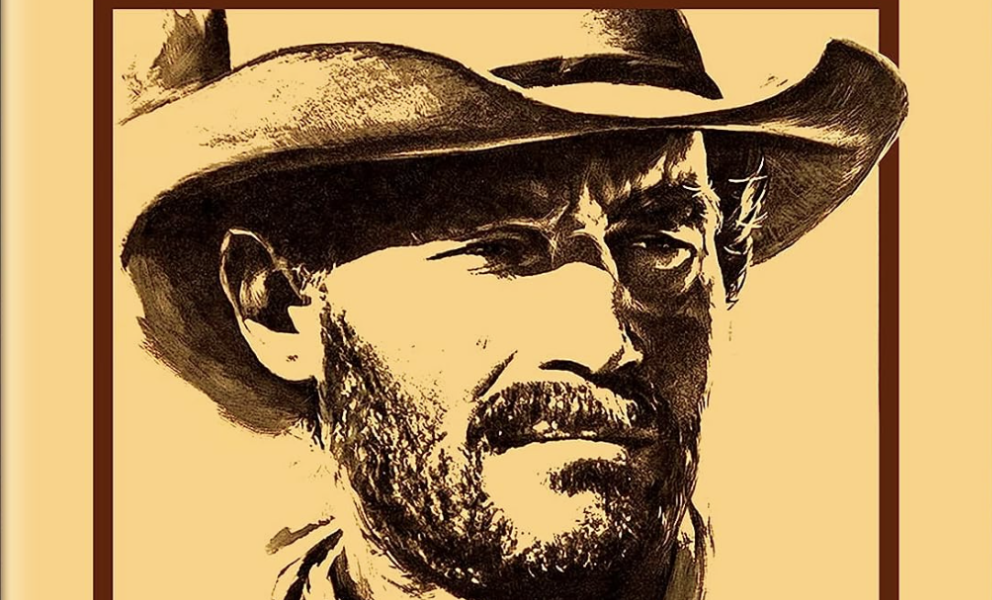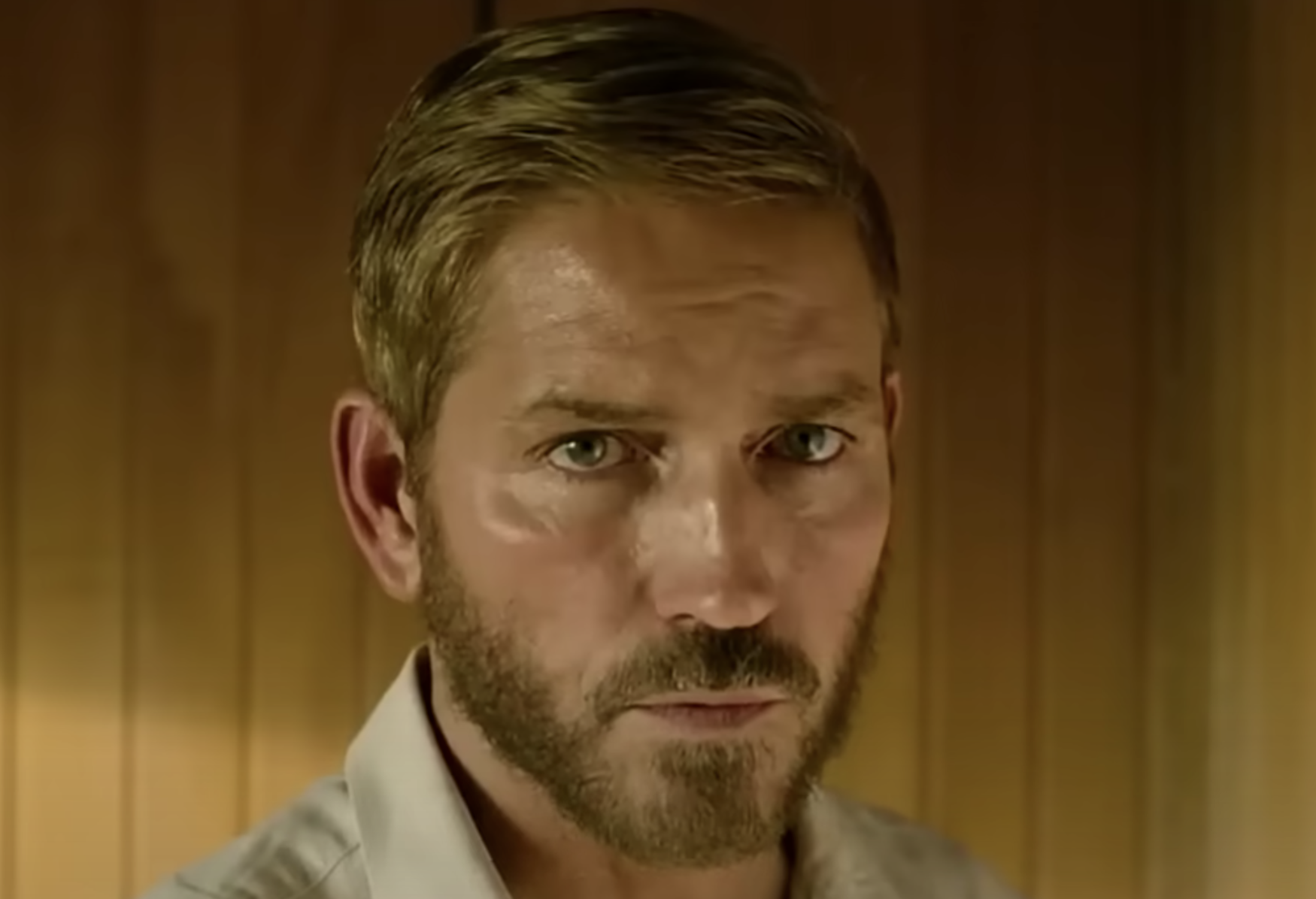Some 14 years ago I was part of a Fantastic Mr. Fox press junket in England. It allowed me to visit the Great Missenden home (a.k.a. “Gipsy House“) of the late Roald Dahl (9.13.16 – 11.23.90). I was further allowed to visit the backyard studio where Dahl wrote his many books. I sat, in fact, in the upholstered, mustard-colored armchair that he sat in while writing in longhand.
Whacky “Wonka”
Paul King‘s Wonka (Warner Bros., 12.15) is obviously an exercise in charmed whimsical fantasy. But it is, apparently, set in 1950s England. (Clearly indicated by the cars and clothing worn by extras.) It serves as a prequel to Roald Dahl‘s 1964 novel “Charlie and the Chocolate Factory.”
It’s not really 1950s England as it actually was, of course. It’s 1950s England by way of diverse presentism. And only a truly foul and poisoned person would even mention this obvious fact.
Timothee Chalamet, Keegan-Michael Key, Rowan Atkinson, Sally Hawkins, Olivia Colman, Hugh Grant and Jim Carter.
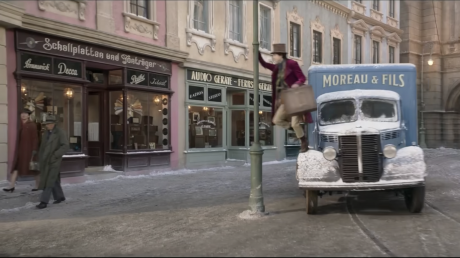
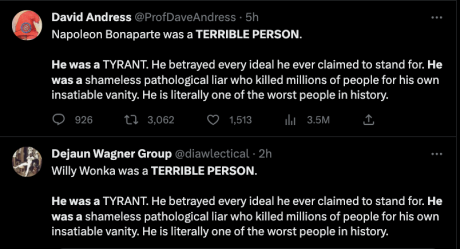
Oppie’s Big Day in Paris
Everyone who cares about first-rate, upscale, drop-your-pants cinema will soon be seeing Oppenheimer (Universal, 7.21), and the vast majority will almost certainly love it for various smart-guy reasons — the intense Nolan-esque focus, the mindblowing visual scale, the fierce ambition, the psychological intensity.
I’m certainly not expecting it to be any kind of financial shortfaller, although I suspect it will register with a fair percentage of the viewing public as not escapist enough but that’s fine — who wants brainless escapism from an effete aesthete like Chris Nolan?
But I had to laugh this morning when I read a one-word comment on Jordan Ruimy’s World of Reel site…written by a guy I don’t know (and probably don’t want to know) called “Hannibal Lolocaust”.
The morning actually started with two dismaying Letterboxd grades from a couple of French critics who saw Oppenheimer in Paris this morning, named “peachfuzz” (i.e., Emmanuel van Elslande) and Nathanael Bentura. The former gave it 3.5 stars out of five; Bentura gave it 3 stars. Obviously the opinions of two small-time French guys is statistically insignificant, but if I were Nolan I’d be going “hmmm.” Just a little bit. Especially when you add that tweet from Sean Nyberg.
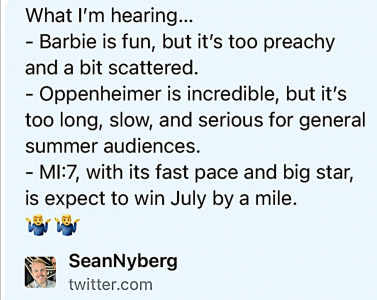
Why isn’t someone saying it’s an ecstasy pill…a profoundly fascinating journey? I know, I know — Kenny Turan was very impressed.
Here’s another fellow who was favorably impressed: “It is very destabilizing. It’s very long with multiple movies in one, but in the end it’s pure Nolan. Quite fascinating. I don’t want to oversell it either, but it’s at the top of the basket of Nolan films, I would say.”
What does “very destabilizing” mean, I wonder? Not following a clean narrative line or something?
Turan: “Arguably Nolan’s most impressive work yet in the way it combines his acknowledged visual mastery with one of the deepest character dives in recent American cinema, Oppenheimer demanded to be explored on its own [terms] with as much depth as possible.”
HE to friendo: “What the hell is Kenny actually saying? Deep character dive. What, in a submersible?”
Friendo to HE: “It’s largely a character study, apparently.”
HE to friendo: “Jesus, now it’s starting to sounmd like a chore to sit through. From everything I’ve read and watched J. Robert Oppenheimer has always struck me as a gifted genius physicist, but deep down he was a strand of overcooked fettucini. Sensitive to a fault. Who wants to hang out for three hours with a guilt-stricken weeny?”
Friendo to HE: “The embargo lifts at 5:30 pm today. Right after the Paris premiere.”
HE to friendo: “Pack your bags, kids! We’re all going on a long Oppenheimer guilt trip…a deep dive into the Cillian Murphy guilt swamp…splashing around in that swamp like Bela Lugosi in Bride of the Monster…just kidding. And yet, as I’ve said two or three times, WITHOUT showing what actually happened, horrifically, in Hiroshima and Nagasaki on 8.6.45 and 8.9.45. What about the incidental fact that the Japanese bad guys, obstinate and fanatical to an agonizing fault, had to be defeated, and as ghastly and horrific as the atom bomb was, those two homicidal explosions ended the war with Japan? Naahh, the Murphy guilt swamp is more compelling.”
Friendo to HE: “I don’t think Nolan just focuses on the A-bomb. He zeroes in on Oppie’s destructive obsessive nature as a man.”
HE to friendo: “Yeah, I’m getting that.”
Friendo to HE: “Allegedly there’s full frontal nudity. Murphy and Florence Pugh as Jean Tatlock, an off-and-on lover of Oppie’s in the late ’30s and a Communist party member who came to an unhappy end.”
“The Wind Was Blowing Hard…”
HE to friendo: “I’ve chatted with Jim Caviezel a couple of times — once during a junket for The Thin Red Line, and another time in a Park City restaurant during Sundance around 21 or 22 years ago — and I can tell you that up close he’s a very nice and gentle and courteous fellow. But in this clip he seems like a very eccentric Christian dude. No offense but a little bit whacked. I love what he’s saying about the utter painlessness and the peace of death…the heavenly transition and all that. I’ve had mystical notions myself along these lines, as I was a stone Bhagavad Gita mystic when I was 19 and 20. But he also seems a tiny bit weird.”
SAG Strike Imminent
Variety‘s Matt Donnelly is reporting that a SAG strike is not only imminent but hours away. If there’s no deal by Wednesday then forget it — the whole industry shuts down. No more promotional appearances by talent (including appearances at the Venice, Telluride, Toronto and New York film festivals) as well as a halt of all film and TV productions. “It would be a miracle at this point” to reach a deal by this Wednesday, one producer told Donnelly. As with the WGA strikers, the key issue appears to be about the sharing of streaming revenues. I don’t know anything but this is what’s being reported as we speak.
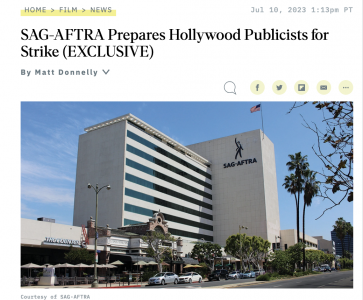
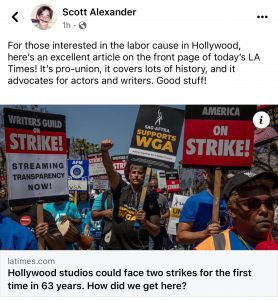
More of a Ritter Than a Kittridge Man
When Mission: Impossible — Dead Reckoning Part One opens tomorrow, audiences will rediscover Henry Czerny‘s Eugene Kittridge, playing not just the IMF director but one of the great all-time, upper-level, intelligence community dickheads.
If you’re any kind of fan of this franchise, you know that Kittridge, who’s been absent since his debut appearance in Brian DePalma‘s Mission Impossible (’96), is a near carbon copy of Czerny’s original upper-level intelligence community dickhead — CIA deputy director Robert Ritter in Phillip Noyce‘s Clear and Present Danger (’94).
While Ritter and the ’96 version of Kittridge were two peas in a pod — identical appearance, brusque, cynical, bespectacled — the present version of Kittridge is a slightly different species. Gray-haired, a bit heavier and with a sense of the absurd about the high-end intelligence car-chase and train-wreck racket, as some of his lines register in a deadpan humor vein.
HE is more of a fan of Ritter than Kittridge as Ritter would never, ever fuck around — he meant every damn word and never considered any sort of black-humor perspective.
What am I really saying? Clear and Present Danger played it straight and for the most part unironically while Mission: Impossible — Dead Reckoning Part One is a double tracker — mostly an ace-level thriller but partly (or at least at times) a Buster Keaton action film, as some of the action hijinks summon titters and guffaws.
I’ve Never Seen “Will Penny”
I suppose I’ve no choice but to order the Bluray and hope for the best.
“And I got to really like [Charlton Heston]. A lot of people told me that I wouldn’t like him, but I liked him. And he tried very hard. I mean, Will Penny is far and away the best thing he’s ever done.” — Bruce Dern.
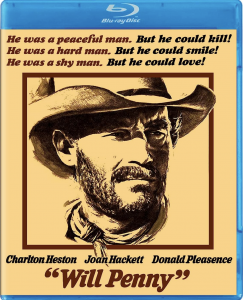
Rationale For Orr’s “French Connection” Pussyfooting
Unfriendly friendo: “I figured I’d clarify the situation on that recent French Connection piece that you’re so riled about. The one written by the N.Y. Times Magazine‘s Neila Orr, I mean.
“First off, the New York Times Magazine operates from a completely different staff than the daily paper does. One hand is never informed as to what the other is doing. Given the writer is a story editor on the magazine, it’s likely that she just decided to write it up herself.
“Second, the front-of-the-book rubric under which the piece appears, “Screenland,” is strictly an opinion (or wankery) column. It’s not reported as such. It’s just a given writer going off. So the author can’t be faulted for not doing reporting; it’s not a reported column — it’s a thumbsucker. You’re asking something of it that it doesn’t have to be. It’s an op-ed and it’s written as such. I didn’t find Orr’s piece particularly satisfactory, but that’s the way it is.”
HE replies: “Nonetheless Orr, cautiously assigned to write about the the French Connection censorship for an obvious reason, was writing a piece about a still-unsolved and mystifying situation, and she didn’t even attempt the boilerplate option of asking for explanations from Friedkin and Disney. I’m sorry but that’s stunning. How long does it take to make a couple of calls or bang out a couple of emails? What, she couldn’t be bothered?
“Imagine a Times staffer writing a thoughtful essay about the recent disappearance of Amelia Earhart in, say, early August 1937, or only a few weeks after Earhart’s plane was reported missing on 7.2.37. Imagine a Times staffer not even inquiring about the latest findings while putting the piece together.
“As a representative of The N.Y. Times, Orr would have obviously been able to request statements or perhaps even land an interview or two — a request that may have actually elicited a response, given the Paper of Record’s lordly history and cultural standing.
“And yet Orr chose not to go there because…what’s the explanation again? Because she and her editors live inside an elite, cloistered, administrative membrane (i.e., the Times‘ weekly magazine) that apparently derives satisfaction and solace from, among other things, turning off the curiosity switch.
“But hey, at least she was able to exercise her authority (by way of identity and birthright) by typing out the actual N-word. Impressive! I’m sure this got the attention of Donald G. McNeil Jr., who was almost certainly amused.”
“Sound of Freedom” is Solid, Subdued
I’m sorry to disagree with the five or six sniping naysayers out there, but HE agrees with Variety‘s Owen Gleiberman and the Critical Drinker about Alejandro Monteverde‘s Sound of Freedom, which I saw last night at the AMC Sono8.
This is an entirely decent, well-honed, approvable, maturely-judged, non-exploitive genre film about a solemn, real-life good guy (Tim Ballard, played by Jim Caviezel) struggling to save kids from south-of-the-border sex traffickers, and two kids in particular.
The mere thought of young tykes being used as sex slaves is obviously enough to make anyone’s skin crawl or stomach turn, but the film doesn’t subject you to anything even semi-explicit, thank God — it’s all implied. (Not that this implication makes Sound an easy sit — it’s not.)
Nonetheless child trafficking is real and widespread and the film (which was shot five years ago) is reflecting statistical reality as far as I’m able to discern.
You don’t have to be a rightwinger to accept or recognize that Sound of Freedom is dealing straight cards, but there’s a tendency, I’ve noticed, among lefty critics to put it down because of the bizarre QAnon associations. I too have a problem with wacko righties and their “Pizzagate” conspiracy theories. But the lean and mean Sound of Freedom feels steady and subdued and un-fraught with cliche. No shoot-outs, only one ultra-violent confrontation, no feeling of any sort of Mel Gibson-like fetish for blood and bruises.
Ballard is easily Caviezel’s best role since The Passion of the Christ (’04), and the basis of his finest performance in 19 years. And Bill Camp has a juicy supporting role as Vampiro, a former bad guy who’s looking to atone for past sins. He’s always smoking cigars and constantly slurping liquor, but his heart is in the right place.
I catch films at the Sono8 from time to time, and one of things I like about going there is that there are almost always acres of open seats. I’ve rarely attended a showing that was even half-full. Except for last night, that is. I attended a 6:50 pm show (the actual film starting at 7:15), and every last seat was filled except for the front-row seat that I’d reserved. This means something.
Muscular, Platinum Blonde Gayboy Feels Under-Appreciated
But there’s solace in the fact that several gay friendos feel Ken’s pain and have his back, etc. Strength in numbers!
HE Was Just As Derelict As The Others
In the matter of the besieged Jonathan Majors, I decided between late March and late April that the actor was in serious career trouble and probably toast. On 3.25 Majors was arrested in Manhattan on charges of strangulation, assault and harassment of longtime girlfriend Grace Jabbari.
I noted that two statements seemed to mitigate — one by Majors’ attorney Priya Chaudhry that claimed Majors is “innocent and has not abused anyone,” and that “irrefutable evidence [shows] that the charges are false”, and another by the 30-year-old Jabbari that the incident had been overblown and that she didn’t mean to create all this trouble.
But then Majors was dropped as a client by both his management company, Entertainment 360, and the public relations firm, the Lede Company. And then on 4.19 Variety‘s Tatiana Siegel reported that “sources” are saying Majors “is now a suspect in multiple cases of assault and abuse” and that “several alleged victims have reportedly come forward and are cooperating with the D.A.’s office.”
Figuring he was probably done for, I didn’t even pay attention to a 6.29 N.Y. Times story, reported by Jonah E. Bromwich and Chelsia Rose Marcius, stating that the N.Y.P.D. has evidence to arrest Jabbari.
Chaudhry is saying that the charges are “a complete lie“, and that in fact “it was Ms. Jabbari who assaulted her client.” [Chaudhry] has also said that Ms. Jabbari, a dancer who had worked as a movement coach on one of Mr. Majors’s movies, stole personal belongings from his home. Chaudhry is stating that Jabbari “physically confronted Majors, hitting and scratching him, and that she went out clubbing and later passed out in a closet at his home, waking up with injuries to her finger and ear.”
Excerpt: “Late last week, the police issued what is known as an I-card for Ms. Jabbari. The I-card, which appears in a department database, is different from an arrest warrant, which is typically signed by a judge, but alerts officers that there is probable cause to arrest Ms. Jabbari.”
World of Reel‘s Jordan Ruimy brought the 6.29 Times story to my attention. I apologize for having blown it off.
